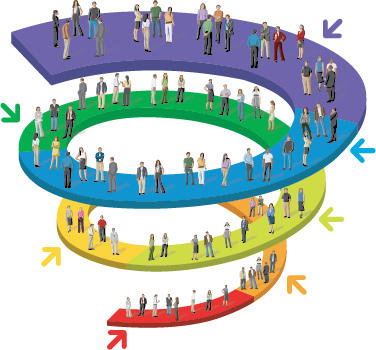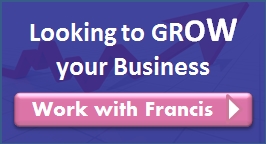
by Francis | Business, Self Development
Are you like Shrek?
Funny question, I know…
…but I think humans are actually a lot like ogres.
Remember when Shrek was trying to explain to Donkey what ogres are like and had the “onions / layers” conversation with Donkey?
[Click video for dialoque]
Well, like ogres, humans are also wonderfully complex creatures…
We also have many layers and there’s a lot more to you than meets the eye. 🙂
But have you ever really think about…
How well do you know yourself and your layers?
How well do you know:
- Who you really are as a person?
- What makes you happy
- What are you truly passionate about?
- What do you want from your business…from life in general?
- Why do you want it?
- What motivates you?
- What do you dislike?
- What makes you angry?
- What are your values?
- What are your biggest fears?
- What are your greatest strengths?
- What will you do anything for (to have or get)?
Research has consistently shown that people, who truly understand these basic things about themselves, tend to be stronger performers and better leaders in their industries.
It’s not just about knowing your strengths and weaknesses; it is also about understanding your personality and knowing what is important to you because that knowledge drives your behavior and the decisions you make in life AND your business.
In business, understanding your own layers helps you make better decisions in terms of:
- The services you offer
- The type of clients you want to work with
- How to interact with clients
- How to perform your work on a daily basis
- How to manage your business and resources to progress faster
- How to promote your services and attract more ideal type clients
Success in life starts with clarity…
Knowing and understanding who you are, what you are willing to do, what you want in life and why you want it is often the starting point of creating a successful business…
…because only then you can direct your thoughts, plans and actions to achieve all the things you want.
To Your Success

PS: What are your thoughts? Share it with us in the comment section below. And if you enjoyed this article, it’s easy to share using the buttons below!

by Francis | Business, Marketing Tips |
 You can save a lot of time, get more clients and run your business more effectively when you use systems for everything you do.
You can save a lot of time, get more clients and run your business more effectively when you use systems for everything you do.
Doing marketing, drawing clients into your pipeline, staying in touch with prospects and clients, scheduling client consultations, converting prospects into clients, keeping records of client communication, billing clients, tracking income and expense etc. etc. are all tasks you do on a regularly (even daily) basis. Creating a system around each of these tasks or activities, makes it easier to do, saves time and can even put your business on autopilot when you are not in the office.
So, what is a system?
Without going too much into details, a system is a set of steps, methods or procedures you follow to carry out a specific activity, perform a task or solve a problem.
Thus, to create a system for a specific activity in your business you’ll need to know all the specific steps you follow – from start to end – to complete that activity.
In practice, creating systems do not need to be complicated. The only requirement is the systems should work best for YOU and YOUR business. Ultimately the purpose of a system is to save you time and to put most of your repetitive tasks on autopilot so they can take care of themselves with no to minimum involvement from you.
Systems save time and put most of your repetitive tasks on autopilot.
Click to Tweet
Here are examples of 5 systems to simplify the process of getting more clients.
Doing Marketing: If networking and frequently attending live events is one of your marketing strategies, a system can simply be to schedule the dates of all the networking events in your calendar. This way you do not have to remember everything as your system will do the work for you. You can even set a reminder for a couple of days before the event to allow for any preparation, if needed. This way you won’t forget about the event and will be well prepared when you attend. Scheduling is a simple system that can help you stay consistent in attending those in-person events, saves time because you know it is scheduled and you’ll be reminded in time, and you’ll feel more confident when you show up, since you had ample time to prepare.
Filling your Client Pipeline: An example of a system to fill your client pipeline is to use your website, email marketing software and a free offer to capture the contact details of visitors to your website. You can direct all your marketing efforts (the people you meet at events, all your off-line and online marketing) to your website and let your well-oiled system takes care of getting these web visitors into your client pipeline so you can stay in touch with them. This is a system that can be set up once. And best of all, it runs on autopilot while you sleep or are miles away on vacation
Staying in touch: It is important to ensure your prospects don’t forget about you. When staying in touch you continuously build relationships with your prospects and keep your services and offerings in front of them. One way to stay in touch is to publish a regular e-zine (electronic newsletter). An example of creating a system around your e-zine is to create a list of topics you want to share with your audience on regular intervals and then to schedule those topics into an editorial calendar of when each will be send out. An important part of this system is also to schedule the time in your calendar to write the content and populate your email marketing system. When you use email marketing software like Aweber, you can write your content in advance and schedule it to go out on a specific date. This saves time and have the added benefit that your communication are send even when you take an extended vacation.
Convert prospects into clients: Once people are interested in working with you, a new client conversion procedure or system can do wonders for your business. An example of a system here is to have a form on your website where prospects can inquire about your services. Once they’ve filled in the form, they receive an automated email to set-up a complimentary discussion where you get together on the phone. For the discussion you can use a specific, pre-developed script or format to lead your prospect from just inquiring about your services to becoming eager and willing to work with you. The system is taking care of all the pre-work and you only have to be there to conduct the discussion and convert the prospect into a new clients.
New Client Intake: When a prospect becomes a client, it is good business practice to give them all the information they need for working effectively with you. An example of a system when a client says “yes” is to have a client information pack (or welcome pack) ready to send to this client. The bulk of this information pack and regular client communications can be pre-developed and only customized per client. This saves a lot of time and prevent you from re-inventing the wheel for each new client.
With workable and automated systems in place, you can simplify and streamline the process of getting clients and accomplish most of your daily client related and administrative tasks in a matter of minutes, not hours.
Systems put time back into your day – time that you can spend on growing your business with clients and income and/or taking a well-deserved break.
Your assignment for today:
- Pick one thing. . . just one thing in your business and create a system around it.
- Start documenting all the steps you take to complete that.
- Evaluate what you can do to automate / facilitate all the repetitive activities to help you save time with this in future.
The ultimate goal is to create systems that don’t require your attention every minute of the day.
To Your Success

P.S. Do you use systems in your business? Tell us about it in the comment box below.

by Francis | Attracting Clients, Business, Marketing Tips
 If you’ve been in business for a while, you would have heard from more than one marketing expert that knowing your target audience and clients REALLY well, is the beginning of a positive upward spiral for attracting more clients to your business.
If you’ve been in business for a while, you would have heard from more than one marketing expert that knowing your target audience and clients REALLY well, is the beginning of a positive upward spiral for attracting more clients to your business.
This speaks for itself, because the better you know your clients, the better you can tailor your marketing message to solve their biggest problems, the better they’ll relate to your message – making it easier for you to attract them and convert them into paying clients.
Thus, knowing your clients is critical to your business success….and it starts with your ability to put yourself in your clients’ shoes – to truly understand who they are and what they need.
So, here are 8 important things to know about your clients that will put your business and client attraction on an upward success spiral.
1) Who are they?
Everyone talks about the importance of defining a target audience and ideal client…yet very few businesses actually do it. However, the clearer you are about who you work with, the easier it will be to get to know them AND to identify places to find them.
2) Where do they spend their time?
Knowing where they spend their time, helps you to also be present – either in person or via your marketing materials.
3) What do they struggle with?
Every business has a number of frustrations and struggles that they want to get rid of. What are those struggles for your clients as it pertains to what you do? Knowing what they struggle with can help you position your business to become their problem solver.
4) Why are they struggling with it?
There is always a reason why people struggle with something. E.g. do they have these struggles due to time constraints or lack of specific knowledge and skills or lack of technology and equipment? Finding the reasons can help you tailor your services and marketing to solve those problems.
5) Why would they work with you?
Do you stand out from your competitors? What will be the deciding factor to help your clients decide that you are the one to work with?
6) Why do they need your services?
Understanding why a client needs your services means that you can approach him at the right moment when he is ready to work with you. E.g. if you provide financial tax support, you can start promoting your tax related expertise during the start of tax season, increasing the likelihood of attracting clients searching for tax help and advice, because they might not feel confident enough to do it themselves or they want to save time.
7) What do they expect when working with you?
Understanding client expectations means you can encourage a positive customer experience from the start and maximize the chance of repeat business. E.g.when you know what they expect, you can bring that into your very first client conversation to put them at ease about working with you. Then ensure you do that to retain their business.
8) What are their top 3-5 priorities / goals?
The more information you have on what your clients’ top priorities are, the better you can position your marketing and your services to assist them reaching those goals faster.
Knowing your clients is a powerful way to propel your business forward. It allows you to make positive changes in your own business to accommodate their unique and varied needs. This helps you stand out and makes you much more client attractive.
To Your Success


by Francis | Business, Marketing Tips |
 A business that attracts lots of clients is a business that focuses on service excellence.
A business that attracts lots of clients is a business that focuses on service excellence.
Anyone can give a service and find some clients, but someone who focuses on service excellence, will have a business that prosper and will attract clients into long-term relationships.
On vacation to Romania last year, I started to understand what service excellence really means and how it can practically put your business on a totally different level than your competitors.
While exploring the ski slopes of Poiana Brasov, a small town in Romania, we noticed one restaurant that was bustling with customers every single night, while others barely had one or two tables occupied. So, obviously we wanted to try it out. Due to a huge language barrier, we had to call in the help of our hosts at the B&B we were staying to make reservations for us for the second week of our stay. It turned out that this restaurant only take reservations and is normally fully booked for weeks in advance – even in off-peak seasons.
The wait was absolutely worth the while and here’s why.
Upon entering the restaurant, we were personally greeted at the door by the owner of the restaurant and taken to our table which was made of rough, solid sleeper wood and was beautifully laid out with sparkling silverware and fresh flowers (in the middle of winter in snow-filled mountains – that is a big wow). The chairs were covered with snow white sheep skin for added warmth and comfort. A big log fire blazed away in one corner and a traditional band with dancers kept us entertained with great lively music. We were just seated when they brought us warm, freshly baked bread with real butter. We were served complementary glasses of spicy “gluwein” (obviously the price of the wine was worked into the food somewhere, but the mere fact that it was not reflected on the bill made it special). The waiters were extremely efficient. The food was delicious and the presentation was faultless. A small mint chocolate was served with the after meal coffee. The bill was reasonable. All in all one of the best restaurants I’ve ever visited.
So, what made this Romanian restaurant stand out above the other restaurants in that area as well as above many of the so-called five star restaurants we’ve visited in our life before?
Well, everything they did had one goal in mind: Service Excellence.
Making you feel welcome; making you feel good by just being there. Attention to detail and small things like the chocolate with the coffee, fresh flowers, the personal greeting at the door, the beautiful table, clean silverware, the festive atmosphere, the complimentary gluwein, good food and good service – all working together to ensure a full restaurant and customers coming back for more.
That made me think: If a restaurant owner in the middle of nowhere can keep his restaurant fully booked for weeks in advance, how can we apply the same service excellence in our businesses as well.
For me, service excellence is about:
- Showing a great attitude towards your clients;
- Enjoying what you do and knowing how it can benefit your clients;
- Displaying exceptional behaviours and applying those to your client relationships.
- Finding ways to make your clients feel good about your services, your business and themselves because they simply feel good when dealing with you.
Here are some practical ways to create service excellence in your business:
Listen to your clients.
Let your clients talk and take the time to identify exactly what they need by asking questions and concentrating on what they are really saying. Listen to their words, tone of voice, body language, and how they feel. Show that you are listening by making the appropriate responses and suggestions or giving alternative options on how to improve things. By just listening to your clients, they not only feel heard and understood, but you also pick up on valuable nuggets that can help you improve on your service to give them exactly what they want and need.
Be reliable and deliver on what you say.
Reliability is one of the key aspects to any good relationship. If you say, “Your report will be ready on Tuesday”, make sure it is ready and delivered on Tuesday. Do not “over-promise” and then “under-deliver”. Rather do it the other way round – under-promise then over-deliver.
Always play open cards with your clients and be honest in all your negotiations.
Don’t tell a “half” truth or withhold information from your clients, just to “save face” or earn a few more bucks. When you are honest about situations, even when you’ve made a bad mistake, you’ll win the client’s respect and trust.
Deal with complaints promptly.
No one likes hearing complaints, but when a client complains, the chances are there might be a problem or a misunderstanding that is causing it. Listening and solving complaints is an ideal opportunity to restore goodwill, keep a client and build stronger relationships. Handling complaints can also help you to improve your procedures thus eliminating or minimising similar issues in future.
Pay attention to small detail and give them more than expected.
Be creative and give your clients what they do not get elsewhere. People love to get more than they thought they were getting – and it doesn’t need to be something big to be effective. E.g. send a small gift when someone start a big project with you; include a thank-you note when you’ve completed a project; send a message on their birthday– even when you’re not working together anymore; follow-up and thank them even when they don’t buy from you; send them information to help them in their business without expecting anything in return; give them a coupon for a couple of additional service hours. There are all sorts of ways to go the extra mile and to give them more than they expect. They may not say so, but people notice when you make an extra effort and will tell other people.
Creating service excellence in your business doesn’t cost much, but it can mean a world of difference to your clients and your business. If you deliver service excellence consistently, it’s a free form of marketing. Over time your business will become known for its good customer service and you’ll create a business that prosper and attract clients into long-term relationships.
Your take-away assignment for this week
How can you create even more service excellence in your business to make your clients come back for more? Please go ahead and share your ideas in the comment box below. Let’s all learn from each other.
PS: “If you enjoyed this post, the greatest compliment you can give me is when you share this with others. It’s really easy! Just use the buttons below. Thanks! I sincerely appreciate it.”

by Francis | Business
 It doesn’t matter how you look at it: pricing your services can be a difficult task.
It doesn’t matter how you look at it: pricing your services can be a difficult task.
The good news is you have some flexibility in how you set your prices.
The bad news is there is no true formula you can just pull off the shelf and apply in your business.
Pricing your services involves part number crunching, part experience and part guesswork.
But however it may be, below are 7 key factors that you can take into account for setting the best rate for your services.
1. How Much Do “You” Cost?
How much is your blood, sweat and tears worth? Think about it: by being self-employed, you are also incurring an opportunity cost by NOT making yourself available elsewhere for a dependable salary or receiving a nice benefit package from an employer. Please, don’t get me wrong on this. Being an entrepreneur was one of the best decisions I made in my life, but it is good to bring things into a “financial” perspective by thinking about what you are “giving up” and what you are “gaining” by being self-employed.
2. Your Business Running Costs
When setting your rates, you need to figure in all your business expenses and running costs. If you don’t, you might price your services at a rate that does not produce a profit in the end. Ensure you factor in all the hidden costs of your business like insurance, taxes and invoices that might not get paid for one reason or another.
3. Your Profit Percentage
Somewhat related to your costs, think about how much money you want to make above breaking even. This is business after all.
4. Market Demand
If what you do is in high demand, e.g. a lot of people are searching for these services it can positively impact on your rates and you can easily increase your fees.
5. Industry Standards
It’s sometime hard to know what others are charging for the same or similar services you deliver. But try asking around. The more you know about industry standards, the better you’ll know how to position your business in the market. As a solo entrepreneur, it is however never a good idea to position yourself below the market to try and win clients based on price.
6. The Value You Add to Your Clients.
Think about the value that a client will receive from working with you. How will working with you benefit or positively impact their lives and/or business? Set your rates accordingly.
7. Your Niche and Target Audience.
Your niche and target market can impact your rates. For example, think about the difference between Revlon and Chanel: Both companies make perfume but Chanel targets a small niche market of elite clientele and thus charges a high price for their products while Revlon targets a broader market and thus offer their products at a more affordable rate. Figure out how you are positioning yourself and use it to determine your rates.
In the end, all these intangible factors can have an impact on pricing your services and it is important to think about them as they can help you determine the real “worth” of the services you deliver.
Once you’ve decided on a price, continue to test the market and remember to raise your rates from time to time.
In the end, how you price your services could be the difference between a profitable and thriving business or a struggling one.
So go out there and charge what you are worth!
Now, I want to hear about you and what you think about rates. Tel us in the comment box below which of these factors you’ll use to price your services in future.
PS: “If you feel someone else can benefit from this list of factors, you are welcome to share this with others. It’s really easy! Just use the buttons below. Thanks!”

by Francis | Business |
 In business, the worst thing you can do is to procrastinate. It is a silent enemy that kills your success without you even realizing it. Sadly we all fall prey to this silent killer.
In business, the worst thing you can do is to procrastinate. It is a silent enemy that kills your success without you even realizing it. Sadly we all fall prey to this silent killer.
Napoleon Hill said in his book Think and Grow Rich: “Procrastination is the bad habit of putting off until the day after tomorrow what should have been done the day before yesterday.”
When I look at procrastination, it’s not even the things that you’re putting off until the day after tomorrow; it’s those things that you have on your list for weeks and weeks and months and even years…. the things you know you should do, but for one or other reason you never get to do it!
For me, one of the biggest reasons why people procrastinate (and here I’m also talking about myself too) is because of fear.
We are often afraid of what other people will say or we fear that we will not be good enough or look good enough or talk good enough and then we just don’t take action on it.
For example we fear to pick up the phone and call that potential client or strategic partner because we fear the outcome. Perhaps they will reject us and say no to what we offer. Or we fear they will say yes and then we have to deal with the change that brings. We fear that we might not have what it takes or might look like a fool when we do it. So we procrastinate on getting the things done that we fear – or worst, we never even take action on it.
The problem is: there are a lot of silly fears keeping us stuck. They keep us playing small and prevent us from stepping up and building the business and the life that we know we deserve.
Other culprits and common subconscious thoughts that make us procrastinate are:
- I don’t know where to start
- I don’t have the necessary skills or the right tools
- I’m not in the right mood right now
- I don’t like this task. I don’t want to do it.
- This stuff is just plain boring
- No one really cares whether I do this or not
- I’m just waiting for the best time to do it
- I need time to think this through
The scary part though is what procrastination is costing your business!
Every minute. Every hour. Every day you procrastinate you lose time, opportunities and even money.
Just think about it in your own life and business: How many opportunities did you miss out last year because you procrastinated on taking action? How many hours were lost? How much money did you lose out on? How many goals just never realized?
When you start to think about the cost of procrastination, you’ll realize that it is a silent enemy that kills your success.
So, I’ve made a conscious decision in my business that from now on I will be conscious about procrastination and take note of the times it surfaces. Then I’ll take action in spite of the fear or in spite of the difficulties standing in my way. Because with every action I take, I’ll make progress and move forward.
Are you with me?
To Your Success


![]()










